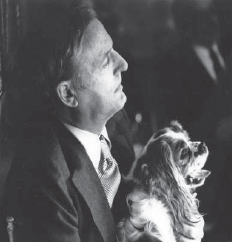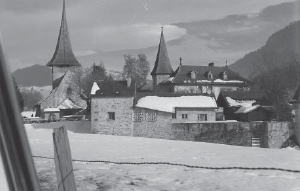Read Losing Mum and Pup Online
Authors: Christopher Buckley
Losing Mum and Pup (16 page)
I flash-forwarded through a deeply unpleasant filmat-eleven news segment, starring me, being arraigned for assisting suicide.
I saw the district attorney stepping before the microphones.
We have found sufficient evidence to indict Christopher Buckley, son of conservative icon—
he’d be sure to put it that way—
William F. Buckley Jr
.—
for homicide.
On the bright side, maybe I’d get to spend some quality time with Michael Skakel.
The conversation proceeded:
Pup, I…
I struggled over how to put it, stuck between my inability to tell him that I simply didn’t see “the religious aspect” as
an impediment and my technical concern at being an accessory to suicide. But I’d learned the English language at the knee
of one of its masters and, improvising, reached for the subjunctive.
Pup. Suppose, say, one were—accidentally—to ingest more than a, you know,
prescribed
dosage of sleeping pills. Given your normal, say, high rate of ingestion, producing, as it does, a state of mental confusion…
would that, really, qualify in the eyes of the Church as… you know… I mean, I’m hardly a priest, but still…
He was propped up on his pillows, his eyes wandering sadly and philosophically into space. He looked at me with a flicker
of the old wryness.
“I know what you’re driving at,” he said. We stared at each other. Neither of us spoke.
“Well,” he said, “to be continued.”
I left him to his nap, the religious aspect before us unresolved. As I passed through the sitting room, I glimpsed on a side
table an advance copy of my current novel,
Boomsday
(
This one didn’t work for me. Sorry
.
xxB
). I heard the district attorney add,
This crime is especially heinous given the fact that Christopher Buckley’s new novel advocates mass suicide as a means of
solving America’s Social Security fiscal crisis.
Unfortunate coincidence, but—might be good for sales.
13
I’d Do the Same for You


I
was supposed to leave mid-July on a long-planned trip to California. One night as we watched the first of three—or was it
four?—movies, he said apprehensively, “When are you leaving for California?”
“I’m not, Pup. I’m going to stay here with you.”
He began to cry. I went over and patted him on the back. He recovered his composure and said somewhat matter-of-factly, “Well,
I’d do the same for you.”
I smiled and thought,
Oh no, you wouldn’t.
A year or two ago, I might have said it out loud, initiating one of our antler clashes. But watching him suffer had made
my lingering resentments seem trivial and beside the point.
I had wondered, while keeping this vigil with him, whether to bring up certain things and talk them out so that when the end
came, nothing would be left unsaid between us. But each time I hovered on the brink, I found myself shrugging and saying,
Let it go.
Perhaps it was another way of saying, as I had to Mum that night in the hospital,
I forgive you,
on the installment plan. I felt no need for what is called in other contexts “the exit interview.” I was able to love him
now all the more and actually laugh (inwardly, anyway) at that “I’d do the same for you.” Oh yeah? Ho, ho, ho.
When I was eleven, I spent three weeks in the hospital without a visit from him. True, he was on a trip to South Africa at
the time, and in 1962, South Africa was a long way off. Still. When finally the doctors told Mum that I might not make it,
she flashed word to him:
Come home.
And that he did, briskly, catching the next flight and changing planes—as he related proudly—in Nairobi, Cairo, Athens, Rome,
Paris, London, and… Reykjavík! His absence from my sick-bed was not any failure of love. It was, perhaps, just how it was
in those days: The mothers took care of the children. By the time he arrived back, I was out of danger, and he brought with
him spectacular presents: a leopard-skin rug, which he christened “King Kaiser” and whose head would serve as a gnaw bone
to generations of Cavalier King Charles puppies; also a splendid ceremonial Wilkinson sword of the type, he said, carried
by the guards at Buckingham Palace.
P
UP’S LEGENDARY IMPATIENCE
—a trait among the Great—could sometimes be, well, maddening. Ten minutes into my college graduation ceremony, he got bored
and rounded up the family and friends in attendance and whisked them off to lunch at what we now call an “undisclosed location,”
leaving me to spend my graduation day wandering the campus in search of my family. I ended up having my graduation lunch alone,
at the Yankee Doodle Diner. When I confronted him back home, grinding my back molars, he merely said airily, “I just assumed
you had other plans.”
Pup—on my graduation day?
He could be a bit aloof that way. He could also be absentminded. When my mother went into labor with me, Pup and Uncle Firpo,
Mum’s brother, bundled her down the elevator at 444 East 57th, hailed a cab, got in, and drove off to the hospital, merrily
chatting away; only after five or six blocks did they bother to notice that they had left her standing on the curb. She delighted
in telling that story.
By the beginning of August, I had convalesced—if the verb can be used transitively—him back to some semblance of health. I’d
been with him night and day since mid-June. Lucy reported that my fifteen-year-old son, Conor, had been reduced to looking
me up on YouTube. I ached to be with him, yet I feared leaving Pup, sensing as I did that every time I left might be the last
I saw him. But I had to get away, and I comforted myself knowing he would be looked after by the devoted Danny and a household
staff of five. He would not be left to depend upon the mercy of strangers.
I woke early, bursting to go. Pup was still asleep, amid the doggies and a heap of crushed reading matter and the chugging
oxygen machine. I kissed him, tiptoed out, and made it to our summer rental cabin in Maine in less than eight hours, where
Conor and the Faithful Hound Jake were waiting for me in the little studio house. It felt like heaven. That night, to the
smell of pine woods and the cry of loons, I e-mailed him.
Dear Pup, I don’t know when you’ll get this but I just wanted to say how much being with you these past weeks, despite the
circumstances, has meant to me. I love you very much. Your devoted Christo.
He replied the next day,
OChristo, that note on TOP of everything you have done for me! XXXXp
14
Please Not to Arrest My Dear Father


I
n September, his health deteriorating, Pup announced his intention to go back to the Mayo Clinic.
Why, Pup?
To find out what’s
wrong
with me
.
This was a bit of a conversation stopper, for by now it was pretty well established what was “wrong” with him: emphysema,
diabetes, sleep apnea, skin cancer, heart disease, the usual prostate afflictions.
I didn’t know what to say, other than a stammery,
Um, what is it you think they’ll be able to do for you?
Tell me how to get
better.
It came out like a martini: six parts serious and one part wry. I nodded,
Well, why not?
Pup had always said, “Despair is a mortal sin,” and though postreligious myself, I still admired the sentiment.
*
You don’t want to tell someone who is dying (emphysema is progressive and incurable),
Forget it, you’re toast.
At the same time, one doesn’t want to hold out false hope.
The Mayo—venerable institution that it is—had a certain grim resonance in our household. In the early 1980s, David Niven had
come to stay with Mum and Pup in Stamford after receiving the definitive diagnosis there that he had Lou Gehrig’s disease
(amyotrophic lateral sclerosis).
David had been alarmed some months earlier by an appearance on
The Tonight Show
with Johnny Carson. David was one of the great raconteurs. He had told some very funny stories on the show, but that night
after the taping, watching himself on TV in his hotel room, he was shocked by what he saw. He slurred his words and mumbled.
He sounded
drunk
. The debility worsened, accompanied by other enfeeblements. Finally he took himself to Mayo, where he received the awful
diagnosis. I remember Pup looking horrified as he told me that David had pressed the doctors to know what, exactly, would
kill him in the end and was told: Suffocation.
You’ll reach for a breath and eventually it won’t be there.
This was a haunting memory for me now, given Pup’s increasing difficulty breathing. But, bowing to his wishes—one didn’t
not
bow to Pup’s wishes—we drove him to La Guardia one Sunday morning and put him on a plane for Rochester, where he would be
met and taken to the clinic. He choked up when we said good-bye on the curb at the airport. I offered to go with him, but
he said no.
The next morning, my phone rang: Julian, reporting that Pup had been found wandering around the lobby of the Mayo hotel in
the middle of the night, “apparently a bit disorientated.” I prepared to fly to Rochester; but by then Pup had announced that
he had no further use for the Mayo and was on his way to the airport to come home. By the time he got back to Stamford, he
was exhausted and physically depleted. I could barely make out what he was saying over the phone. He rallied a bit in the
days following, but it was now clear that we were, as he often put it in other contexts, “approaching the point of diminishing
returns.”
Some years before, he’d gone off to Lourdes along with his friend William E. Simon, who’d been Nixon’s secretary of the Treasury.
The thought of these two—one a prominent political and journalistic figure, the other a captain of U.S. industry and former
administrator of the world’s biggest exchequer—carting lame and diseased pilgrims to and from the grotto where the Virgin
Mary had allegedly appeared to a peasant girl is, well, humbling. One typically makes a pilgrimage to Lourdes for a special
intention; Pup never vouchsafed to me what it was, but it was about the time I had declared my agnosticism, and I speculated
whether he was petitioning Our Lady on my behalf.
